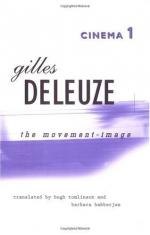|
This section contains 516 words (approx. 2 pages at 400 words per page) |

|
Montage Summary and Analysis
The third level: the whole, the composition of movement images and the indirect image of time presents montage as determination of the whole by cutting and continuities, despite Eisenstein's view that montage is the whole of the film. Montage is composition that releases the indirect image of time or duration from movement-images. Griffith raises montage to a specific dimension that enables distinction into the four trends and schools of organic in American school, dialectic of Soviet school, quantitative of pre-war French school and intensive trend of the German Expressionists. Griffith's discovery is the composition of movement-images as an organism or organic unity. His differentiated parts in relationships create a parallel alternate montage with parts succeeding according to rhythm, enlargement of detail to show relative dimension like close-up insertion, and finally convergent action. For example the races of chariot and car converge...
(read more from the Montage Summary)
|
This section contains 516 words (approx. 2 pages at 400 words per page) |

|




